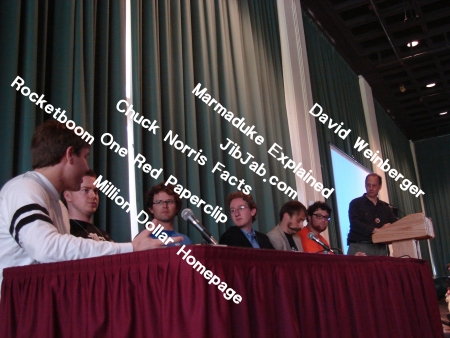David Weinberger on Fame Culture We Create
April 28th, 2008 — marycjoyce
Last Friday I went to ROFLCon, the “rolling on the floor laughing” convention. It was a two-day event organized by an enterprising group of Harvard undergrads (and sponsored by the Berkman Center) to celebrate and explore internet memes and culture.
Why is this an appropriate topic for the Internet & Democracy blog, you might ask. Although the conference was ostensibly about funny Internet memes it was really about how Internet is fueling the growth of user-generated culture – cultural democracy, if you will. Internet fame, which Berkman fellow David Weinberger discussed in his keynote address, is a perfect example of this new cultural democracy, in which ordinary people, not resource-rich broadcasters, are now able to identify a new class of famous people, redefine the parameters of fame, and otherwise re-tool the way fame operates in our culture. What will the political implications of this new citizen power be?
David Weinberger, author of Everything is Miscellaneous and Berkman fellow, gave the opening keynote address at ROFLCon on Internet fame. Fame began with the broadcast system, which operated one to many. Media companies broadcast information, which we received gladly and were glad to know.
Who could broadcast – and thus who could be famous – was all cast in turns of scarcity. Very few people could afford to be in either group. Because it was an economy of scarcity, it also fed very well into a culture greed. Greed and fame go together well because fame is grounded in scarcity.
Famous people form their own special class. They have own rules. You can shoot someone in the face and nothing will happen to you. Famous people are different from us. It is all about alienation. The nervousness of seeing a famous person is a reaction to your awareness they this person is somehow above you, an elite.
But if fame is a network effect (rather than a broadcast effect), then this dynamic changes. Blogging is all about removing the make up. It is the work of a fallible human being, and the forgiveness we give a blogger for making the occasional spelling error is a form of intimacy.
A lot of online productions look like they were made by human hands. Perfection is the enemy of credibility. We once used to believe what was perfect and now we believe the reverse. Nothing can actually be perfect, so if it seems perfect that just means that the flaws are hidden. Perfection alienates us from credibility.
The nature of how fame works is different now. In 1999 a Turkish man named Mahir Çağrı created a personal homepage. “WELCOME TO MY HOMEPAGE!!! I KISS YOU!,” the page began. It was one of the first web fads. People passed the link around. Mahir was famous on the web. It is impossible to know why people passed the link around. There was some condescension, but others liked his enthusiasm. The point is that we made this guy famous by passing around the link to his site. It was revenge against 100 years of broadcast. Once he had this fame he used it to campaign for world peace, not a bad effect.
Now that fame is in our hands we pass around things that are funny and even pass around our reactions to these things we think are funny. it is an odd conversation we are having with ourselves. This is actually a P2P thing.
In the future, everyone will be famous to 15 people. This is a way of handling fame in an age of abundance. Fame on the Internet is roughly a power law curve, the omnipresent “long tail.” At the highest level of popularity, is Obama girl with 8 million views, then bollywood Obama with 289,000 views, then there is Kevin Kelly‘s idea that most musicians have only 1000 true fans. As the curve continues, it becomes notty. People make each other famous by recommending each other to small groups of friends and to one another: one to many, one to a lot, one to few, one to none…
Some online fame mimics broadcast fame. Some mocks broadcast fame, and does both at once. Online fame is funny and demeaning and confusing and brilliant. It is flawed and human. It is our fame. It looks like us. We are making it ours as we are doing with much of our culture. Fame now reflects us.
Cross-posted on ZapBoom.com
image credit: Mary Joyce






 Click Here
Click Here
June 25th, 2008 at 4:21 am
thanx